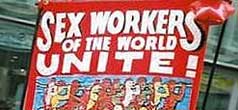A call for sex workers’ rights in Africa

A global conversation about the rights of sex workers is happening without African voices, writes Chi Mgbako. While activists on other continents have successfully organised to engage governments in dialogue, the criminalisation of the trade in Africa has pushed sex workers to the fringe, compromising more than economic protection in the industry as health, safety and legal rights are sidelined. Until African voices can be heard in the struggle, African sex workers will continue being denied their core rights as stigma and discrimination plague their ‘illegal’ livelihoods, argues Mgbako.
African governments must reconsider their legal and policy posture towards sex work in order to respect and uphold sex workers’ human rights.
African sex workers throughout the continent experience stigma, discrimination, and abuse at the hands of police officers, clients, pimps and societies that shun and revile them. African governments do not characterise violence against sex workers as an issue of violence against women. Hospitals and health centers sometimes refuse to provide sex workers with medical treatment. Police often bribe, harass and abuse sex workers. Clients assault sex workers with impunity. African societies often view women engaged in prostitution as morally compromised vectors of disease. Because of their illegal status, and the stigma and discrimination they face, African sex workers often have no recourse to justice and cannot fight for their rights.
Most African sex workers engage in prostitution because of economic pressures. Single mothers and young women with limited or no familial support may view part-time or full-time sex work as an economically viable option when alternatives prove elusive or undesirable. African women who choose to enter prostitution often receive no emotional or legal support. There remain few sex worker collectives in Africa, and African women’s rights organisations tend to shun issues on sex workers’ rights. There is no African country in which prostitution has been decriminalised; Senegal embraces a regime of legalisation and regulation, not decriminalisation. These realities make sex workers more susceptible to abuse.
African government officials have publicly characterised prostitution as incompatible with African culture. These public statements are often accompanied by mass raids resulting in the arrest and imprisonment of scores of sex workers.
Despite strong anti-prostitution sentiment on the continent, calls have begun to emerge for the realisation of sex workers’ rights in Africa. South African sex workers have advocated for the decriminalisation of prostitution in their country. There are examples of sex worker collectives forming in Cameroon, Zambia, Kenya and Senegal. However, these examples of African sex worker collectivisation are limited. The international sex workers’ rights movement blossomed four decades ago and although European, US, Latin American and Asian sex workers have been active participants in the global conversation on sex workers’ empowerment, African sex workers have been largely absent in this dialogue. The establishment of African sex workers’ collectives is a necessary step in the creation of a sex workers’ rights movement on the continent.
A critical reflection on the continent’s need for action around sex work is timely. In the past several years there have been encouraging regional attempts to engage the issue of sex workers’ rights. In 2008, women’s rights and development organisations held a sex workers’ rights conference in East Africa in order to identify the links between health and human rights and sex workers’ rights. During the conference, jointly sponsored by Akina Mama wa Afrika and the Open Society Institute, advocates accused East African governments of failing to condemn and address the rampant abuse of sex workers. Advocates also maintained that government tolerance of discrimination and abuse of sex workers increases sex workers’ vulnerability by driving them underground and out of reach of health, social, and justice services. Similarly in 2007, the Mozambique National AIDS Council and the United Nations Fund for Population Activities (UNFPA) organized an ‘HIV and Sex Work’ conference. This gathering culminated in the Maputo Call for Action – a call for the elimination of violence, stigma, and discrimination against sex workers; the strengthening of legal and health support systems targeting sex workers; and the creation of partnerships advocating for sex workers’ rights.
The illegal status of prostitution in African countries directly effects sex workers’ ability to organise and demand their rights. Criminalisation of prostitution and thus criminalisation of sex workers themselves leaves these women without legal and health protection and further entrenches the stigma and discrimination they face. African states should reform their legal posture towards sex work and decriminalise prostitution.
BROUGHT TO YOU BY PAMBAZUKA NEWS
* Chi Mgbako is a clinical associate professor of law and director of the Walter Leitner International Human Rights Clinic at Fordham Law School.
* Please send comments to [email protected] or comment online at Pambazuka News.

